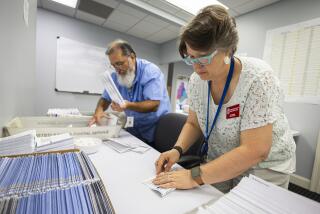Some in China Try to Crib a Key to Their Future
The goal was as old as the hills, the technology as new as the latest cellphone.
China has been rattled by disclosures that students taking nationwide college entrance exams last month in Henan province left the hall early, raced to a makeshift cheating command center and used computers to relay the answers to students back in the hall via cellular text messages.
Even more disconcerting were suggestions that teachers and principals were involved, either by turning a blind eye and letting cellphones into the testing centers or actively helping students.
Students reportedly paid up to $120 for the answers -- a huge sum in a nation where the average annual income is $1,000. And, some parents groused, the information wasn’t even completely accurate.
The scandal has sparked hand-wringing in the press, the Education Ministry and universities. It also irritated many who played by the rules.
“I’m really angry,” said Bu Lin, 18, a high school student in Shandong province who had to shake off a bad case of nerves before taking the exam. “I heard about this group cheating, and it’s really unfair.”
Authorities have come down hard on the culprits. The Communist Party is under growing pressure to fight corruption, consistently a top source of discontent in citizen surveys.
More than a dozen local and provincial officials were punished, and the principal of scandal-marred County School #3 was fired. The seven who organized the cellphone scam were arrested and may be tried under draconian “theft of state secrets” laws, potentially subjecting them to the death penalty. The school lost its right to hold the exam for two years, and those who bought the answers scored zero on all subjects.
Despite the outrage, allegations of cheating and corruption involving key tests are perennial.
“Examinations and cheating are like twin brothers who are always together,” said an article in the China Daily. “But the scale of cheating in these recent cases is a stunning sign of the erosion of moral education in the country’s school system.”
Part of the problem, experts say, is the amount riding on this exam. Fewer than 20% of this year’s 7.2 million test-takers can expect to get into college in the world’s most populous nation. While those who get in can nurture dreams of fame, fortune and urban creature comforts, those who don’t often face a life of drudgery in China’s vast rural heartland.
Experts also criticize the uncompromising way students are judged. People who don’t test well, who are sick or who otherwise have a bad day are out of luck. College seats are filled solely on the basis of the three-digit number that arrives a few weeks later; high school grades, extracurricular activities, personality and potential are ignored.
Students and their families have a lot to gain by artificially boosting their test scores, given that every added point allows the test-taker to cut in line ahead of tens of thousands of other hopefuls.
Teachers and administrators also stand to gain a lot from the cheating. Beyond the immediate lure of fat bribes, secondary-school educators can expect bonuses, promotions and added prestige if college acceptances increase.
“There’s a saying, ‘Wherever there’s a dead body, there’s a vulture.’ As China deconstructs, there’s more room for greed and immorality,” said Xia Xueluan, a sociology professor at Beijing University. “People proctoring exams, writing the test or delivering exams may stray.”
Provincial governments have tried cracking down in various ways. Students in Guangdong province are forbidden to go to the bathroom during the test. Guizhou province uses blocking software and hawk-eyed operators to censor pager and cellphone text messages on examination day. And several districts require students to sign honesty pledges.
Using cellphones is a recent twist in a long tradition of trying to gain an undue edge. In past years, students have been found using wireless mini-earphones and pagers as well as technology-free methods, such as hiding cheat sheets in pens or writing answers on their legs, which female test-takers then viewed by adjusting their skirts.
But it hardly started there, in a nation with a 5,000-year history. The Today Morning Express recently reported from Zhejiang province the discovery of a centuries-old book the size of a dollar bill filled with 1,400 items on astronomy, geography, poetry and essays.
“The book has extremely dense print in a tiny font,” the report said, “and it was believed it was used as a tool for cheating in exams.”
Bu Yang in The Times’ Beijing Bureau contributed to this report.
More to Read
Sign up for Essential California
The most important California stories and recommendations in your inbox every morning.
You may occasionally receive promotional content from the Los Angeles Times.










